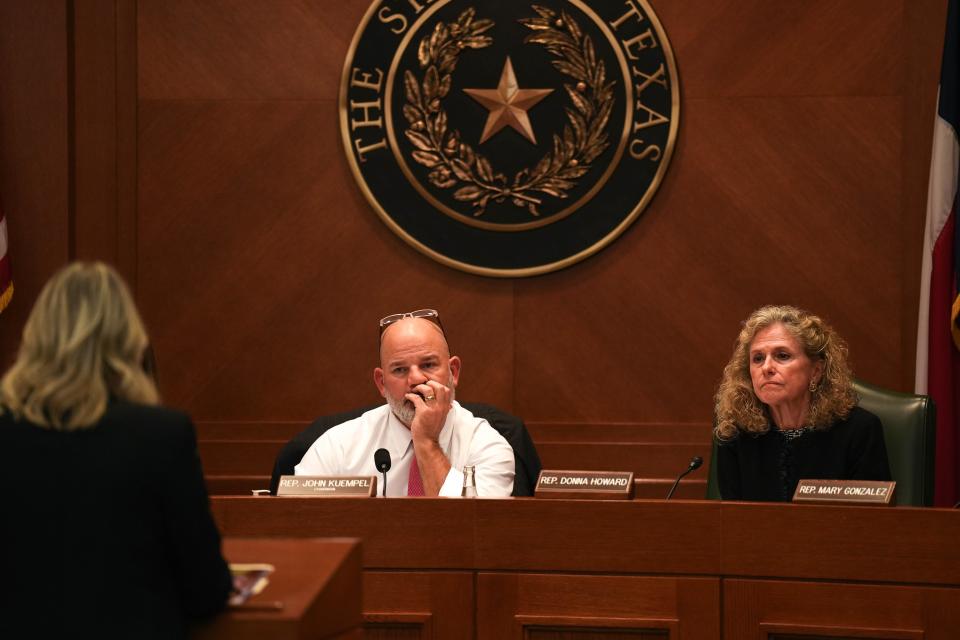Texas House approves bill modifying university faculty tenure policies

The Texas House has given final approval to a bill that would change tenure policies at the state's public colleges and universities.
In an 83-61 vote Tuesday, the lower chamber advanced Senate Bill 18, which would require governing boards overseeing public higher education institutions in the state to adopt policies allowing institutions to fire tenured faculty for several reasons, including "professional incompetence" or "conduct involving moral turpitude."
It also would enshrine a definition of tenure into the state's Education Code.
Rep. John Kuempel, who authored the House's version of SB 18, said the bill provides a framework to the state's universities about what the Legislature expects regarding tenure, including how tenure is granted to faculty members, how tenured faculty are reviewed and when tenured faculty can be dismissed.
SB 18 "will allow for tenure to still be granted and put in place a strong foundation for universities to follow that will provide accountability while maintaining an environment that is conducive to recruiting and retaining the best faculty and researchers in the state and nation," Kuempel, R-Seguin, said on the House floor Monday.
Kuempel, who chairs the House Committee on Higher Education, has previously said he believes Texas universities need to offer tenure. He said it is "forced competition" and is "critical" for the state to recruit the "best and the brightest."
Texas Republicans have argued that reforming or ending tenure will insert more accountability into higher education and make it easier for schools to remove low-performing faculty members. Opponents say the bill would have a "devastating effect" on the state's public higher education institutions.
"This legislation ... has the potential to cause irreversible damage to the prestige of our public universities," Rep. Victoria Neave Criado, D-Dallas, said Monday. "Losing tenured professors amounts to losing expertise from which our students make their marks. Losing tenured professors contributes to the miseducation of our young people. Losing tenured professors will drain millions of dollars from our schools."
Texas Legislature: House gives initial OK to bill banning DEI offices at public colleges, universities
Last month, the Senate passed a substantially different version of the bill, filed by Sen. Brandon Creighton, R-Conroe, proposing to completely ban public colleges and universities from granting tenure to faculty members starting in 2024.
Lt. Gov. Dan Patrick, who oversees the Senate, has said that a tenure ban is one of his priorities this legislative session, which ends Monday.
Patrick last year pledged to end tenure for new hires shortly after the University of Texas Faculty Council passed a nonbinding resolution affirming their academic freedom to teach about race, gender justice and critical race theory.
SB 18 is now headed back to the Senate to sign off on the House's changes. If the Senate does not give its approval, the bill would be referred to a conference committee that would propose a new version of the bill for both chambers to approve by Monday and send to Gov. Greg Abbott to sign into law.
More: Texas Senate approves bill to invest $430M in additional funding for community colleges
Proposed changes to Texas tenure policy
The House's version of SB 18 would amend the code to require state universities and colleges to adopt policies to dismiss tenured faculty for unprofessional conduct "that adversely affects the institution or the faculty member’s performance" or for repeatedly failing to perform one's duties or meet professional responsibilities.
Faculty members also could be dismissed for falsifying academic credentials, failing to complete post-tenure review, violating certain laws or institution policies, or being convicted of a crime affecting their ability to "engage in teaching, research, service, outreach or administration."
The justifications for firing tenured faculty in the bill are modeled nearly verbatim after the Texas A&M University System's tenure policy.
More: Texas House OKs bill to limit on transgender college athletes participation in sports

Kuempel's proposal would codify a definition of tenure into the Education Code as “the entitlement of a faculty member of an institution of higher education to continue in the faculty member’s academic position unless dismissed by the institution for good cause.”
The original version of Kuempel's proposal also would have limited a faculty's property interest of tenure to a regular annual salary, prompting concerns among some faculty members who believed the measure would have made it easier for them to be fired after receiving a year's salary.
However, during debate Monday, the House approved an amendment by Rep. Sheryl Cole, D-Austin, that would expand the property interest to include "continuing employment," including one's "regular annual salary and any privileges."
Faculty, student opposition to Senate Bill 18
The vote's initial passage in the House comes after dozens of university faculty members and students, including University of Texas community members, pleaded with state lawmakers not to pass either version of SB 18 in separate hearings in the House and Senate.
No one, except for invited speakers, spoke in favor of the legislation during public testimony at either hearing.
In a statement earlier this month, Brian Evans, vice president of the Texas Conference on American Association of University Professors, said tenure gives faculty academic freedom to help students develop critical thinking skills and create new knowledge.
More: State lawmakers, Huston-Tillotson students launch Texas HBCU Legislative Caucus
Faculty and university leaders have said that tenure is essential to maintain the quality and status of the state's top public universities, including UT.
The state has the most public universities that have achieved Tier One and Tier Two Carnegie Classification due to tenured and tenure-track faculty, Evans said.
"If robust tenure protections were prohibited, Texas would not be able to compete for top faculty with the 800 colleges and universities that have adopted AAUP principles of academic freedom and tenure," Evans said. "The stature of our public institutions of higher learning would immediately decrease."
The House was initially scheduled to debate the tenure bill on Thursday, but Rep. Ron Reynolds, D-Missouri City, filed a successful point of order on the bill that delayed consideration of the bill until Monday.
Democrats filed additional points of order Monday to delay the bill, but they were unsuccessful. A point of order is a procedural tactic that legislators use to try to stall or kill legislative proposals.
More: Rally at Texas Capitol: Why Texas students, faculty say DEI, tenure is needed in colleges
This article originally appeared on Austin American-Statesman: Texas Legislature: House OKs bill modifying faculty tenure policies

